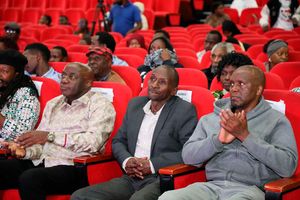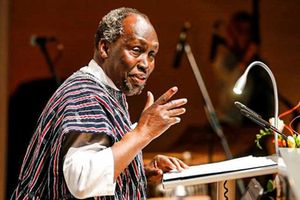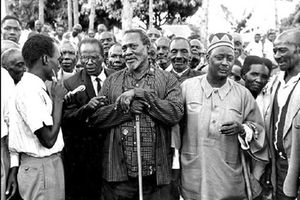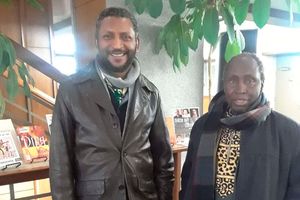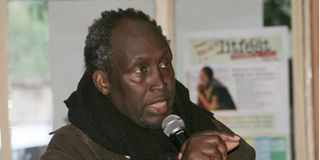
The late Ngugi wa Thiong'o.
There has been a heated debate on the question of burials in the country in the past few weeks. About three weeks ago, Raila Odinga caused a stir among the Luo when he advised that they tone down on eating at funerals.
The lakeside people didn't take the advice politely. They reminded Odinga that people ate a lot at his father's funeral. They argued that it is their culture to eat and make merry when sending off the spirit of the departed.
Well, Raila didn't say people shouldn't eat, drink and dance at burials. He was simply cautioning that the costs during such parties are too high.
On a different note but about death and it's aftermath, Ngugi wa Thiong'o's family recently made the debate much heated. News trickled in that the grandfather of Kenyan literature had been cremated in America. Well, even when the son, Mukoma, confirmed the news, some Kenyans were incredulous. The debates on social media were heated, sometimes bordering on the bizarre.
How can the son of the soil be cremated? Why would he choose to have such a final rite in a foreign land? Can his ashes be brought back home for a proper sendoff? If he argued so strenuously for African cultures, how can he promote such an unAfrican practice? The questions abound.
But remember, Ngugi is dead. As I read some of the sentiments on social media, a friend of mine called and wondered where he could find Ngugi's story: A Mercedes Funeral. This story, published in 1967, is about life, death and burial; and the politics of what Kenyans call 'a warm sendoff.'
A Mercedes Funeral is very dramatic. It has the usual Kenyan social life cast: some politician - John Joe James (previously known as John Karanja); other aspiring politicians, including a retired Chief; a barmaid; an aspiring businessman; some miserable soul, a watchman at Ilmorog Bar and Restaurant, one Wahinya; and the 'locals' or Wafanyi Kazi etc. The intrigue in this case is the death of the watchman - Wahinya, who had died from alcohol poisoning. Wahinya's death should have been nondescript. But it becomes the basis of a tense political drama. How?
Wahinya died when elections were just around the corner. So, all the aspiring politicians and the incumbent, JJJ, stage a contest to see who would best send off Wahinya. A bizarre spectacle happens when JJJ, the prospective businessman, an aspiring student and the retired Chief agree to a public contest of caskets.
The event turns out like a mass political rally. The four contestants all display their coffins. The student, because of his poverty, chooses a simple wooden casket. JJJ brings 'not a coffin at all, but really an immaculate model of a black Mercedes Benz 660S, complete with doors and glasses and maroon curtains and blinds.' JJJ tells the crowd that Wahinya had expressed a wish... To ride in a Mercedes Benz, one would wonder?
Well, the crowd simply walked away from the dance of the macabre conducted by JJJ and the other aspiring politicians. The locals buried Wahinya 'in a simple coffin.' JJJ still won the election. The student went back to school after a miserable performance. The retired Chief and aspiring businessman were ruined. The storyteller says they ended up imbibing Kill Me Quick 'at Makueni Chang'aa Bar where Wahinya used to drink in his last days.'
This story contains all the tragedies of the postcolonial moment: a departing colonizer; a new local colonizer; aborted ambitions of the local majority who couldn't reach matunda ya uhuru; political chicanery; despondency; death and more desperation. It is telling that Ngugi chose a death and a funeral to highlight the tragedy of the new nation, which, unfortunately, did not renew itself from colonialism.
Today, funerals, which are supposed to be sober and sombre moments for the bereaved are taken over by politicians. They do sometimes sponsor elaborate burial rituals, which include Mercedes Benz hearses, huge bouquets, excessive food and alcohol. In some cases they push aside the immediate family and religious leaders, and convert the occasion into a political contest, without any sympathy for the mourners. They compete to 'offer' false empathy to the widow or widower and their children, and the rest of the family, swearing to take care of school fees or hospital bills or build a new house for living. It is a sadistic ritual.
What wouldn't the very politicians who hadn't read Ngugi's works or honoured him in life have done were his body brought 'home!' How many Mercedes Benzes would have been in show at his funeral? Wouldn't a musealoum or a center or a monument have been offered to his family and friends and followers? Which cousin would have claimed Ngugi to be their first cousin? Did NWT just pull a fast one on our spectacle-loving politicians?
The writer teaches literature at the University of Nairobi

